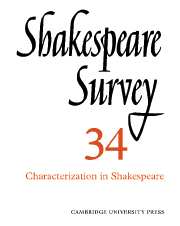Book contents
- Frontmatter
- Shakespeare’s Open Secret
- The Emergence of Character Criticism, 1774–1800
- Society and the Individual in Shakespeare’s Conception of Character
- Realistic Convention and Conventional Realism in Shakespeare
- On Expectation and Surprise: Shakespeare’s Construction of Character
- Shakespeare and the Ventriloquists
- The Rhetoric of Character Construction: Othello
- Characterizing Coriolanus
- The Ironic Reading of The Rape of Lucrece and the Problem of External Evidence
- The Unity of Romeo and Juliet
- No Abuse: The Prince and Falstaff in the Tavern Scenes of Henry IV
- Twelfth Night: The Experience of the Audience
- Plays and Playing in Twelfth Night
- Sceptical Visions: Shakespeare’s Tragedies and Jonson’s Comedies
- Shakespeare in Performance, 1980
- The Year's Contributions to Shakespearian Study 1 Critical Studies
- 2 Shakespeare’s Life, Times and Stage
- 3 Textual Studies
- Index
- Plate Section
Shakespeare’s Open Secret
Published online by Cambridge University Press: 28 March 2007
- Frontmatter
- Shakespeare’s Open Secret
- The Emergence of Character Criticism, 1774–1800
- Society and the Individual in Shakespeare’s Conception of Character
- Realistic Convention and Conventional Realism in Shakespeare
- On Expectation and Surprise: Shakespeare’s Construction of Character
- Shakespeare and the Ventriloquists
- The Rhetoric of Character Construction: Othello
- Characterizing Coriolanus
- The Ironic Reading of The Rape of Lucrece and the Problem of External Evidence
- The Unity of Romeo and Juliet
- No Abuse: The Prince and Falstaff in the Tavern Scenes of Henry IV
- Twelfth Night: The Experience of the Audience
- Plays and Playing in Twelfth Night
- Sceptical Visions: Shakespeare’s Tragedies and Jonson’s Comedies
- Shakespeare in Performance, 1980
- The Year's Contributions to Shakespearian Study 1 Critical Studies
- 2 Shakespeare’s Life, Times and Stage
- 3 Textual Studies
- Index
- Plate Section
Summary
One of the embarrassments of writing about Shakespeare is to discover when one appears in print that, as Hector remarked about Troilus and Paris, one has glozed but superficially on the question at issue. I grew up in the age of Bradley; and, like most Shakespearians of my generation, I was later influenced by the criticisms made of his method by Edgar Elmer Stoll, Lily Bess Campbell, Levin Schücking, and L. C. Knights. I came to assume that Bradley read subtleties into the plays which would have astonished an Elizabethan audience or, indeed, the poet himself; that he was too little aware of theatrical considerations; and that (as Knights put it) he did not know that Macbeth was more like The Waste Land than A Doll’s House. In fact, as we now know, Bradley was a keen playgoer and he always believed and asserted that Shakespeare’s plays were essentially dramatic poems. Some of the most memorable passages in his Shakespearean Tragedy are on a subject he professedly omitted – the poetry of the plays; while, on the other hand, the most memorable passages of his critics are not those where the plays are considered specifically as dramatic poems, but rather those which concentrate on the moral issues raised in them.
- Type
- Chapter
- Information
- Shakespeare Survey , pp. 1 - 10Publisher: Cambridge University PressPrint publication year: 1982

